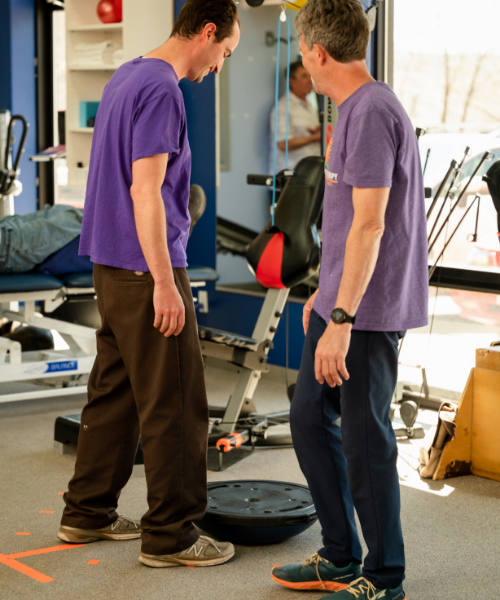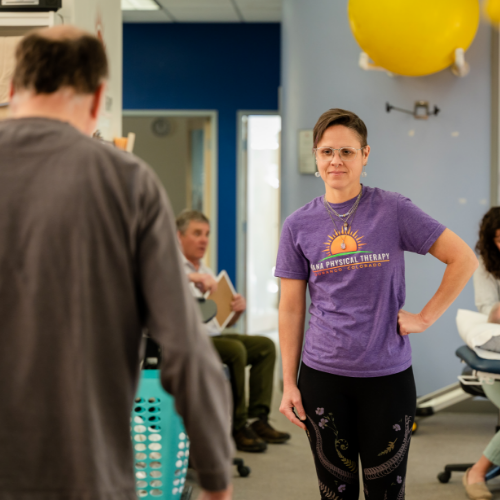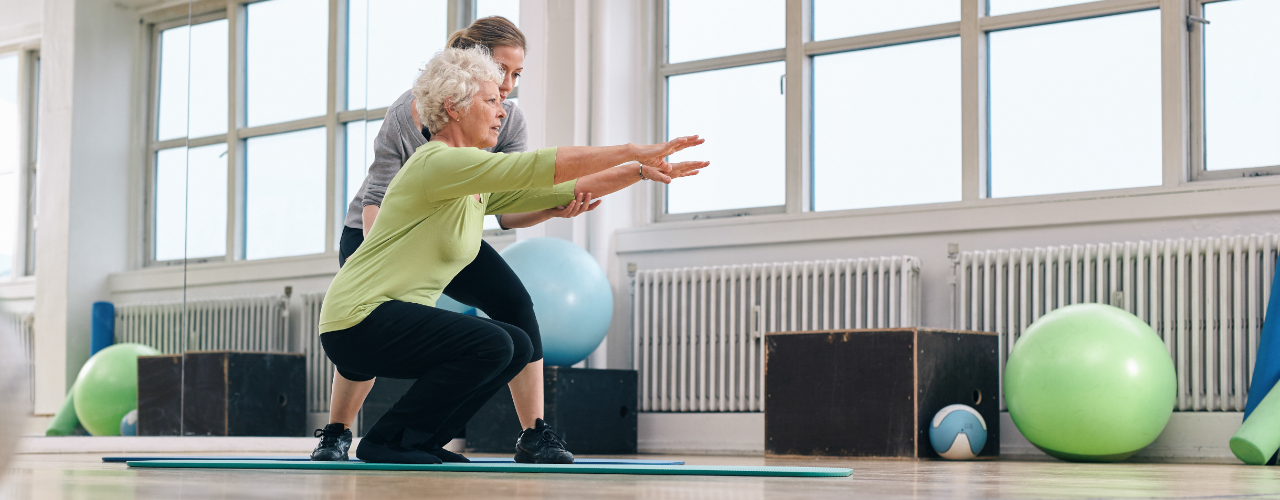Relieve your balance and get back on your feet with physical therapy.
Find the relief you’ve been looking for today.

We’ve all experienced the sensation of being dizzy. It’s not a fun feeling, to say the least. However, for some people, feeling dizzy and unbalanced happens all the time. Do you find yourself searching for walls, railings, or other objects to balance yourself? Is your balance just not exactly what it used to be? If this sounds like you, you might have a balance or a gait issue that needs attention.
Underlying musculoskeletal and neurological disorders can cause or aggravate a problem with your balance or gait. Luckily, our Durango, Colorado physical therapy practice can help you restore and correct your balance.
There are many reasons why this kind of condition may occur, and it may cause both physical and mental limitations in your daily life. At Ohana Physical Therapy, we can manage your symptoms, and in many cases, we can help to relieve your condition.
To find out more about how our balance and gait disorder services can help improve your quality of life, call us at (970) 247-7895 or click here to request an appointment at our Durango, Colorado physical therapy office today.
Why did I develop a balance or gait disorder?
Balance and gait disorders can develop from many different underlying conditions. Many balance disorders are related to issues in the vestibular system, which is responsible for your sense of position, also known as “proprioception.”
Your vestibular system is a delicate collection of fluid-filled chambers and sensory nerves, located in the inner ear, and thousands of nerve receptors in the joints throughout your body. Some common vestibular conditions resulting in balance disorders include:
Injuries and ailments
Even if your brain and nervous system are working in harmony with one another, a sudden injury, disease, accident, or other ailment causing muscle weakness can interfere with your balance and make it difficult to keep yourself upright.
Neurological issues
There are hundreds of different neurological issues that can result in balance and gait problems. They may include Parkinson’s disease, brain injury, or stroke.
Benign paroxysmal positional vertigo (BPPV)
BPPV occurs when calcium debris breaks off in the inner ear, causing issues with balance.
How can a physical therapist help with my balance or gait disorder?

Physical therapy is the best option for balance and gait disorders. Our Durango, Colorado physical therapists can provide you with the best techniques for improving your balance and ability to walk. It’s important to get help if you are having trouble remaining steady, as you want to prevent falling and injuring yourself!
Balance and gait disorders belong to a family of functional problems that interfere with your positional awareness, your normal means of walking or running, and your ability to keep yourself upright.
Having to attend therapy should not be a cause for worry. Rest assured that you’re in good hands in our office! When you arrive for your initial consultation, our physical therapist will conduct a comprehensive physical evaluation to examine your balance, gait, stance, medical history, and symptoms, before creating a personalized treatment plan made for your specific needs.
This treatment plan may include the following exercises and treatment methods:
Vestibular rehabilitation
If you are suffering from a balance or gait disorder, our Durango, Colorado physical therapists will provide you with specific exercises that will move the calcium debris to the correct parts of your ear.
This physical therapy treatment works to improve your vision, nerves, muscles, and the vestibular system as a whole, in order to maintain a steady balance.
Stretches
Stretching will help improve your flexibility and your range of motion. This will give you more control and quicker reactions with your movements, also reducing your risk of injury. It will also keep your muscles from becoming too tight and stiff.
Strengthening exercises
Your physical therapy evaluation will help determine what problem areas in your body may need strengthening. Our physical therapist will provide you with strengthening exercises that will build up your muscles, thus making it much easier for you to move around and reduce your risk of injury.
Gait retraining exercises
Sometimes, abnormalities in gait can be corrected through “retraining” where you learn proper techniques. Runners can benefit from this kind of therapy technique especially.
So, what else should I know about balance and gait disorders?
Balance and gait disorders, while similar, do have many differences. A physical therapist at Ohana Physical Therapy will be able to diagnose your specific condition after a thorough evaluation, however, here is some information on gait disorders versus balance disorders.
Balance disorders
With balance disorders, people report feeling as if they are about to fall, staggering when attempting to walk, as well as a sensation of floating. Blurred vision and feelings of disorientation are also common.
Balance disorders are both physical and mental, as your brain may think you are moving, even when you are not. Changes to your joint strength, mobility, and ability to sense where your joints are in space (proprioception), all have physical consequences on your balance.
Gait disorders
According to Move Forward Physical Therapy, gait disorders account for 17 percent of senior falls. Gait disorders can cause abnormal movements in the way you walk and run, and these can become exaggerated with age. They can also be caused by stroke, inner ear problems, foot conditions, or even something as simple as ill-fitting shoes.
Ready to get back on your feet?
Balance and gait issues don’t have to control your life. Physical therapy can help you! We’re here to help you get back on your feet again.
Click here to request an appointment at Ohana Physical Therapy. We’re going to help you find the balance you’re looking for and teach you how to manage your condition in the future!
Edit
